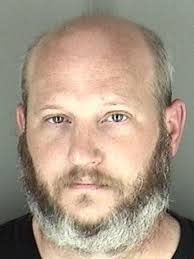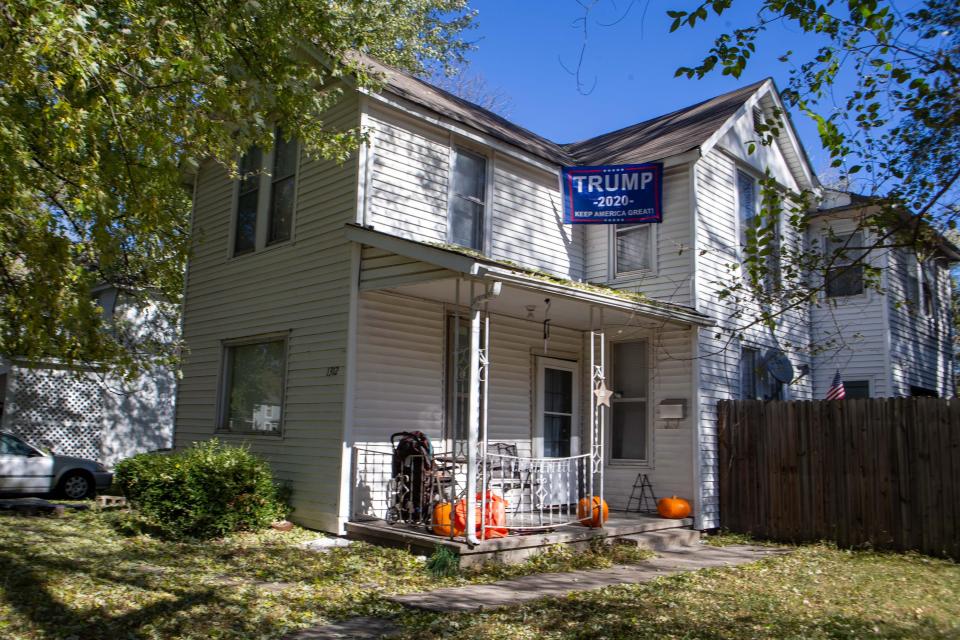Topekan found guilty on 2 counts after shooting teens in confrontation over Trump signs
- Oops!Something went wrong.Please try again later.
A jury convicted a Topeka man of two felonies and acquitted him of two others Friday regarding the Halloween night 2020 shootings of youths in a car he said tried to run down he and his brother as they looked into the theft of Donald Trump signs.
An eight-man, four-woman jury deliberated about three hours before convicting Robert L. Sinner II, 42, of two aggravated battery charges, which they reduced from more serious aggravated battery charges he had faced.
Jurors found Sinner found guilty of aggravated battery committed recklessly causing great bodily harm, which victimized Angel Escobar-Garcia, and of aggravated battery committed recklessly causing bodily harm, which victimized Edgar Valenzuela.
The jury also found Sinner "not guilty" of a separate aggravated battery count and of one count of the criminal discharge of a firearm at an occupied vehicle with great bodily harm.
Friday's verdicts ended a five-day trial overseen by Shawnee County District Judge Brett Watson. Two women who heard the case as jurors were dismissed as alternates that day after Watson drew their names from a hat.

What was Robert Sinner II accused of?
Authorities said Sinner fired shots that injured three teenage Hispanic occupants of a car late Oct. 31, 2020, in North Topeka. The shooting was caught on a security camera video, which was shown at the trial.
All three wounded teens survived. Two, Escobar-Garcia and Valenzuela, suffered serious wounds, prosecutors said. The other reported suffering a burn to his leg from a bullet.
One of the car's occupants — driver Jose Garcia, then 17 — was charged as a juvenile with aggravated assault after prosecutors alleged he drove a car toward Justin Sinner, Robert Sinner's brother, who had been on foot in the same area. The Shawnee County District Attorney's office later dropped that charge.
Court records said the Sinners were convinced the youths were responsible for the Oct. 30, 2020, theft from a neighbor of signs promoting what turned out to be Trump's unsuccessful run that year for reelection to the presidency.
The property owners involved chose not to pursue charges related to the theft.

The teens were playing a Halloween prank, said Shawnee County deputy district attorney Steven Karrer.
Authorities said after the teens came back the next evening, the Sinners armed themselves and went on foot to confront them.
The teens then drove at the Sinners in a speeding car, Robert Sinner said. Karrer questioned whether the teens actually drove at Robert Sinner.
Robert Sinner said he and his brother both fired at the car, Robert Sinner using a rifle and Justin Sinner using a handgun. Justin Sinner wasn't charged with any crimes.
Kansas 'Stand Your Ground' law was used as a defense
Robert Sinner's attorney, Kevin Shepherd, contended at this week's trial that Robert Sinner acted in self-defense under Kansas' Stand Your Ground law.
That law considers a person justified in the use of deadly force against another when the person using force reasonably believes such force is necessary to prevent death or great bodily harm to themselves or a third party as a result of the use of unlawful force by another person or people.
Shepherd said the law consequently required jurors to look at the situation from the vantage point of Robert Sinner, who clearly thought he needed to shoot at the car because it was being driven at him and used as a weapon, Shepherd said.
Karrer responded by saying that for the Stand Your Ground law to apply, it also requires "the existence of facts that would persuade a reasonable person to that belief."
Karrer asked jurors, "Do you, as reasonable people, believe he acted reasonably and in self-defense?"
If jurors didn't think Sinner acted reasonably, the law required them to convict him, Karrer said.
Valenzuela and Escobar-Garcia were "shot in the back" while riding as passengers in the car, he stressed.
Karrer said while the Stand Your Ground law didn't require Sinner to retreat if someone else was the initial aggressor, it gave Sinner the duty to retreat if he were the initial aggressor, which Karrer contended Sinner was.
Victims were 'shot in the back,' prosecutor says
Shepherd stressed that Sinner was in "self-defense mode" at the time, adding, "How do you turn it off?"
Also, Sinner didn't know if the car might turn around and come back, Shepherd said.
Karrer said Sinner himself had acknowledged he no longer considered the car to be a threat at that point.
Contact Tim Hrenchir at threnchir@gannett.com or 785-213-5934.
This article originally appeared on Topeka Capital-Journal: Trial in Donald Trump sign-related shooting yields 2 guilty verdicts

